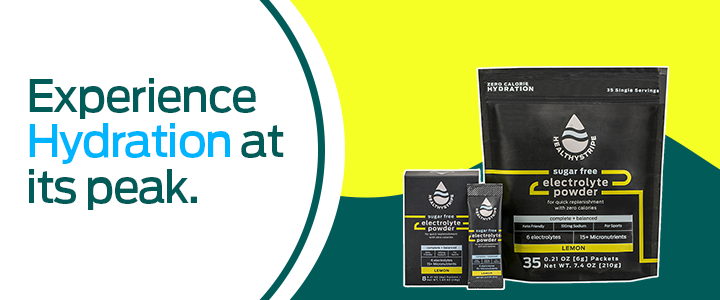
Ever felt your lips parched and your throat dried? Well, This is what dehydration feels like!
Dehydration is a condition of your body when it is unable to function properly due to a lack of water and electrolytes. It either happens when you are not taking as much water as needed, or your body is losing much more fluid than it is taking in. You may wonder, can dehydration cause fever? Well, let’s break the mold today!
According to a study, 75% of Americans were found to be chronically dehydrated, with the elderly community being most commonly affected (17% to 28%) by it. Dehydration is a major contributor to frequent hospital admissions.
Dehydration can be a grave situation that can even lead to serious consequences if not addressed timely. Unlike most people believe, dehydration is not just a shortage of water in your body. In fact, your body simultaneously lacks essential electrolytes like sodium, chlorine, calcium, potassium, and magnesium. Any variation in their amount can disturb the normal salt and water metabolism of the human body. These disturbances can lead to fever due to dehydration. Moreover, dehydration and fever can not only cause but also contribute to many medical conditions. However, maintaining an adequate amount of these in your body is important to perform all the cognitive and physical activities properly.
In this blog, we will explore the truth behind “Can dehydration cause fever?” How to treat fever due to dehydration, its causes, and tips to prevent it.
Fever as a Symptom of Dehydration
One of the common questions regarding dehydration and fever is “ Can dehydration cause fever?” or” Is fever a sign of dehydration?’’ The simple answer is, Yes. Dehydration can cause fever. Not only infants but adults are also vulnerable to getting a fever due to dehydration.
That being said, let us have an insight into the correlation of fever due to dehydration through authentic data.
A study conducted on children presenting in the pediatric emergency department showed a very strong relationship between dehydration and fever. 27% of the children who presented with fever were dehydrated, although no bacterial or viral disease was present in them. Therefore, it can be concluded that dehydration and fever can frequently present simultaneously, and keen attention to fever as a symptom of dehydration can help initiate medical treatment at appropriate times.
Although fever usually occurs when the body is trying to fight and cope with any bacteria, viruses, or foreign body. It is a sign that the body’s immune system has efficiently detected the culprit and is trying hard to get rid of it. However, this is not always the case. Sometimes, fever can also present as dehydration fever.
Yes, you read it right!
No matter how counter-intuitive it might sound but this is a fact! Let’s understand why it is so.
Your body is always striving to maintain its homeostasis. One of the critical functions of hemostasis is to normalize body temperature. Your body needs a temperature of 37C (98.6 F) to function properly. Water is one of the most important components that help maintain this homeostasis because it makes up around 60% of our body weight. Fever due to dehydration occurs when the body is unable to thermoregulate appropriately.
One might think that the body should lower the temperature in such situations, but the negative feedback mechanism alerts the whole system and increases the body temperature leading to dehydration and fever. When you are suffering from dehydration, i.e. lack of water and electrolytes, the body is unable to maintain temperature balance in the internal environment. The body then actively tries to raise its temperature to fulfill this requirement. Hence, this is when you start to experience a fever.
Be careful and watch out for it, especially when you or your loved ones are vulnerable to dehydration fever due to any reason.
Other Symptoms of Dehydration:
Besides dehydration fever, you may experience these symptoms during dehydration and fever:
- Extreme thirst
- Dry mouth
- Dark-colored urine
- Sunken eyes
- Fatigue
- Nausea
- Flushing of the skin
- Muscle cramps
- Dizziness and lack of concentration
- Headache
- Low blood pressure
- Rapid breathing
- No tears in infants
- No wet diapers in infants for more than 4 hours
Skin Pinch tests can be very helpful in detecting dehydration, especially in children. When you pinch the skin, it goes back slowly, indicating dehydration.
What can Cause Dehydration?
There are a variety of causes leading to dehydration, from simpler to complex ones. Either you are simply too busy and indulged in your work that you could not manage to find adequate time for your bodily needs, or you might be in a place where access to water is difficult, like traveling, hiking, etc. Another possibility is there might be an underlying condition like diabetes inspidus, diarrhea, or vomiting leading to dehydration. These conditions cause excessive water loss from the body, and the body is unable to conserve water as it normally does.
An extremely hot environment and high body temperature can also lead to dehydration and fever. The more your body temperature rises, the more it is prone to lose water and electrolytes. Hence, dehydration is more likely to occur in this condition. Moreover, very young or older people who are unable to communicate or fulfill their bodily needs are much more prone to dehydration as compared to healthy adults.
In addition, certain medications such as for blood pressure ( diuretics) and chemotherapy drugs can also lead to dehydration in some cases.
How can Hydration Help a Fever?
Hydration can have a great beneficial role in fever. As explained above, dehydration leads to fever. On the same ground, counteracting dehydration by keeping your body fluids adequate can help you cope with fever by lowering the body temperature. When you suffer from a fever due to dehydration, your body needs an optimum fluid intake.
Dehydration stops the body’s normal antipyretic mechanism, which helps you get rid of high temperatures. Due to this reason, rehydration by fluid intake can help lower the body temperature in fever due to dehydration, and other illnesses. Your metabolism increases, causing an increase in breathing rate and body temperature after losing a large portion of your body water.
That being said, the body has a metabolic process that helps get rid of waste, harmful organisms, and by-products of medications through urine. If you are not taking enough water or losing it at a much higher pace, your body will not be able to flush out all those fever-causing bacteria and viruses. Hence, hydration can help with fever by reducing its intensity and duration. Having adequate water can also prevent a condition like hypovolemia (low blood pressure) and low sodium and potassium levels that can lead to shock during fever.
How to Treat Dehydration and Fever
Adult bodies are relatively different from newborns and infants concerning weight, height, and immune systems. Therefore, different management steps are followed for adults and children suffering from dehydration fever.
Let’s have an insight into the management of dehydration and fever:
Dehydration Management in Adults:
In the case of adults, help the person sit or lay down in a comfortable position. Keep a keen eye on your body temperature by monitoring it regularly. For mild cases of dehydration, water and oral rehydration solution can help replenish the loss. Try to take at least 8 to 10 glasses of clean water. Fruits and vegetables like oranges, cucumber, celery, and tomatoes that have high water content should also be taken. However, pure fruit juices should be avoided as they can irritate the stomach. Instead, they should be diluted with an adequate amount of water to avoid this problem. Encourage the person to take rest until their condition improves.
In case of fever with diarrhea or vomiting, the body loses water rapidly. In these situations, along with water and ORS (Oral rehydration solution), other medical interventions might be needed. You might get IV (intravenous) fluid administered. Ringer lactate and 5% dextrose solution are frequently used for rehydration in such patients. However, this should only be carried out under the supervision of a registered medical practitioner.
If you are a heart or kidney patient or are on certain medication, make sure to consult your doctor before making any changes in your hydration routine.
Dehydration Management in Children:
In children, it is pretty challenging to detect dehydration as they cannot communicate their needs properly. Keep an eye on their body temperature. Look for the amount and color of urine. If the dehydration fever is due to some underlying disease or infection, the patient needs relevant medication not only to lower the body temperature but also to treat the underlying disease or infection causing dehydration and fever.
Paracetamol and ibuprofen are one of the counter drugs available for fever. Cold sponging is also an effective remedy that is frequently used to lower body temperature. In case of high fever from dehydration, vomiting, or diarrhea, immediately contact the pediatrician.
How to Prevent Dehydration Fever?
Hydration is one of the primary steps of management in many diseases, especially those having a febrile phase. It is essential to keep yourself well-hydrated in fever from dehydration. Nevertheless, drinks with a lot of processing and artificial sugars and flavors should be avoided. Beverages like tea, coffee, and some energy drinks should also be discouraged in dehydration and fever as they can cause further diuretic effects in your body by making you pee a lot more.
So, you might end up being more dehydrated than before. It is important to ensure proper hydration for yourself as well as your loved ones to prevent any unforeseen circumstances. If there is a fever due to dehydration, some over-the-counter antipyretics can be taken with a doctor’s advice to maintain and regulate your body temperature.
Conclusion
Dehydration alone or fever from dehydration should not be ignored or taken lightly. It is important to take care of yourself and the people around you who might experience dehydration. Make sure to drink an adequate amount of freshwater and replenish electrolyte levels with an oral rehydration solution (ORS). People who are cardiac or diabetic patients, or are on certain medications like diuretics are much more likely to lose fluids from their bodies as compared to others. Consult your doctor immediately when you have a fever due to dehydration.
Frequently Asked Questions
Does Dehydration Cause Fever in Adults?
Yes, dehydration can cause a fever. When your body is dehydrated and electrolyte balance is disturbed, the body can not maintain its optimal temperature. It causes hyperthermia or fever. On the other hand, an adequately hydrated body can maintain optimal body temperature. Fever due to dehydration is more common in infants and the elderly.
How High is Fever with Dehydration?
Fever due to dehydration can range from mild to high-grade, depending on the severity of dehydration and the presence of any other illness. The fever can range from 99F to 102F or even higher. However, high-grade fever should never be ignored. Immediate medical attention is required in such cases, irrespective of the age group and co-morbidities. The doctor will prescribe adequate parenteral or oral medications along with fluids to bring the temperature down.
Why Does Dehydration Cause Fever?
Our body releases Endogenous Pyrogen (a chemical that causes fever) and prostaglandins E2 when it is dehydrated. These chemicals attract the immune cells, i.e., leukocytes, within the circulatory system, which eventually leads to a rise in the temperature, causing dehydration and fever.
What Causes Dehydration Fever?
A number of conditions can cause dehydration and fever. They include any viral or bacterial infections, e.g., cholera, typhoid, dysentery, or gastroenteritis. The patient keeps losing fluids from the body leading to a higher body temperature. Strenuous exercise that too in summer without adequate replenishment of the fluid loss can also cause fever from dehydration. You might sweat a lot leading to insensible water loss leading to dehydration and fever.









